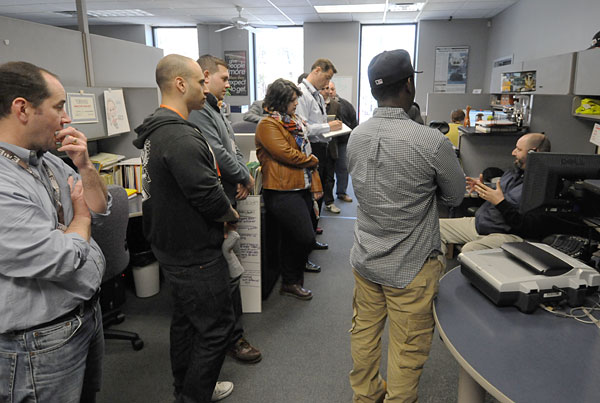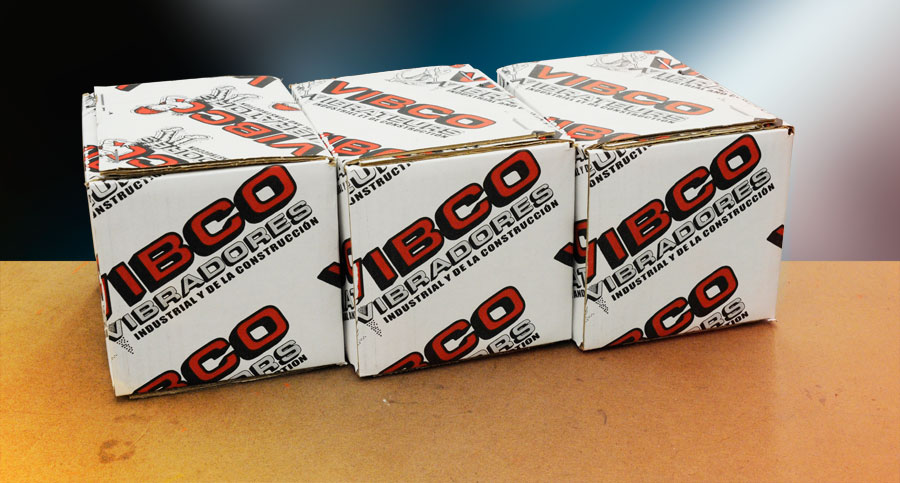
 See a Photo Album from the Visit on Facebook
See a Photo Album from the Visit on Facebook
The following is a first-hand account of the tour from Ray Krause - a Six Sigma Blackbelt and APICS Member. Our thanks to Ray for sharing his incredibly compelling, thoughtful and honest impressions from his visit to the VIBCO Vibration Nation...
Trip Report - VIBCO Tour – Richmond, RI
April 4th, 2013
First Impressions can be deceiving….
At the risk of offending 2/3 of my audience, some will read this report, some will read a paragraph or two and some will discard it immediately. Do so at your own peril. The place was a gold mine for belts or non-belts interested in lean technology and company transformation.
I arrived at VIBCO to find a small (from our perspective) 50,000 sq. ft. factory nestled behind a rock quarry, and met a couple of friendly receptionists who handed us badges. The tour we were invited to had about 45 people with half the contingent Johnson & Wales students and the remainder various engineers, managers, and lean “types” who wanted to tour the facility. The walls were full of paintings, cartoons and marketing history of the nearly 50 year old company. This gave me the first impression of a “touchy – feely” environment. That would change.

Initially all of us were staged in the cafeteria where a brief overview of VIBCO was given alongwith some of their lean & continuous improvement history. They pride themselves as “Made in the USA” and their mantra is “Same Day, Next Day, Quality, Throughput, Innovation”. The one thing to note about the cafeteria is that it obviously doubles as a main conference room for team meetings and the walls were lined with personality profiles, mission statements, meeting minutes (and the kitchen sink, it was busy!).
Just an FYI on their product line, VIBCO Inc. manufactures vibrating equipment for construction, trucking and various equipment that requires shaking to move or transport. They mentioned breakfast corn flakes as an example and said it may get vibrated something like 60 times between the field and your kitchen. They did say vibrators are mandatory for large concrete pouring to help the curing process and to alleviate air bubbles to improve strength.
Being one of their larger tours, we were then divided into three groups and our tour proceeded to the shipping area to see the end of the process supply chain (begin with the end in mind?). We saw a main terminal station and a small conveyor belt with various sized boxes awaiting shipment but nothing out of the ordinary (at first glance). The first thing shown was the box storage area and their Kanban system. A large stack of flat boxes were on production shelving and about 1/3 of the way down the stack were these “flags” which were laminated cards with bar codes to reorder. Basically when the supply gets low enough to release the flag the operator walks to a bar code reader, scans the code and the order for new boxes is automatically placed. Quantities and consolidation had all been done in a previous Kaizan event along with a decision to have a preferred supplier brand the boxes with “VIBCO” logos and markings on virtually all of them. No standard brown boxes existed. All were white and red and the tour guide said “in the event of a lost box” that UPS could find a VIBCO box much easier by sight.

She also introduced us to the lead shipping clerk who showed the visual aids they implemented to ease the burden of determining what to ship and when. A color chart was on the wall with colors representing days of the week. Monday = Red, Tuesday = Yellow, Wednesday = Brown etc. With their same day, next day philosophy they needed to readily see evidence of the workflow. Being Thursday was “Blue” day most of the boxes lined up for shipping had the information printed on blue paperwork that was right with each package. The clerk then explained that the goal was not to see day to day workflow but rather the exclusions or “out of the ordinary” shipments. Purple papers were used to represent either Friday shipments or Hot Priority jobs. At that point you could virtually step back and see at a glance exactly what was prepared and when it needed to go. I did not get photos but it was simple and it worked well.
The next part of the tour was the machining area. We were given safety glasses and proceeded to the back of the factory where a series of Chiron (similar to Mazak) CNC machines were there along with various manual presses and Bridgeport machines. The guide asked if anyone had heard of SMED (Single Minute Exchange of Die) and only a couple of hands were raised so the technician explained the process of going from 2 ½ hours of setup time to 8 ½ minutes. It not only required tooling right next to the machine but was also using computer links to automated setups, along with daily schedules pre-programmed. The one takeaway I gleaned was “Neat and Organized”. The description from five years ago to what I witnessed was hard to put into words. Almost all of the tooling was on carts which gave them the full ability to move and reset quickly. Nobody seemed rushed or “under the gun” and quite of lot of activity was witnessed during the 15 minutes we were there. This was also the part of the tour they mentioned the “One Schedule” and what it represented. Master schedules of all orders were sent electronically but each cell would receive their “One Schedule” of items only for that day. They didn’t go into a lot of detail, but from what I saw it was small, efficient, and very clear what the daily marching orders were.
The third part of the tour was the main assembly area. We were also introduced to Lucy, a 25 year employee who initially balked at continuous improvement, but was now one of their biggest advocates. Her work station was simple but extremely functional. Magnets were used to hold wrenches until needed and to hold a screwdriver in place they simply drilled a hole into the wooden bench and put the screwdriver in the hole! Bins were marked and labeled and it was another area where you had to really key in on just how efficient things flowed. “Low budget but Lean” was my takeaway here. Nobody said lean had to be expensive anyway.in assembly area. Various cells and pods were all centrally located in the factory and our guide brought us to a pair of CNC’s directly in front of the cells and said they were experimenting with spaghetti charts and moving the machining work into close proximity with assembly. One person questioned the work being on the CNC’s as different from the others in the machinists’ area, but the guide said the work was the same. It was truly a project in progress that would cut significant time off of transport and conveyance.

The fourth part of the tour took us back to the front desk and I was wondering if the tour was ending. It was at this time we were introduced to Karl Wadensten, the president of VIBCO. Instead of ending we were introduced to the head of sales and marketing which was the receptionist! She had three video screens wired to her computer and proceeded to show us an amazing type of “Data Mining” and customer service. VIBCO strongly believes in direct contact with their customers and not a switchboard approach. She (and a 2nd person) would field around 300 calls per day and properly get them the support they required for questions and answers. Karl said the one constraint from their perspective is the computer (speed) could not keep up with the operator. In the short time we were there she fielded multiple calls and used various internet sites to capture names, numbers and addresses into their ever expanding customer base (they mentioned 190K customers worldwide with a 16% growth rate annually).
One of the final segments of the tour was meeting the various buyers and customer support personnel who help VIBCO achieve their sales approach. With a worldwide customer base and many unique applications this focused group would not only research solutions but would take customers actual photos and drawings and superimpose the various pieces of equipment “photoshop” style to explain how, when, and where to install. One story was told of a difficult application that was solved by ingenuity and it triggered orders for 100’s of units and a long term repeat customer.
After that the teams rejoined in the cafeteria for a final Q&A. In a surprising move Karl actually asked for feedback and comments from every single person. Their “twin pillars” (as he put it) were “respect for people” and “continuous improvement”. It was after the Q&A that he mentioned over 6000 people had toured the facility in the past three years and they had submitted feedback from all of them.
After the tour I asked Karl about Takt times and throughput and where the information was (how are priorities and bottlenecks figured out?). He pointed me to another conference room and told me to walk inside. What I saw on the inside was basically a “war room” of takt time charts, product structure and resource availability. Many histograms and other assorted tidbits but it was enough to see the “One Schedule” approach in progress. Control Central.
To summarize: A small factory, 70 people, single shift, all interacting and marching forward to True North: Same Day - Next Day, Quality, Throughput, Innovation and 100% Employee Engagement. It was obvious they live this mantra and used it extensively. Some may say it’s still too touchy-feely. I get the impression that VIBCO is laughing all the way to the bank.
Two links:
1) VIBCO’s home page. Good interactive site. Also a link to Karl’s talk show “Lean Nation”
www.vibco.com
2) The book they use to do their employee profiles. Every employees profile is printed and visible throughout the factory.
http://www.amazon.com/gp/product/0743201140/ref=oh_details_o00_s00_i00?ie=UTF8&psc=1